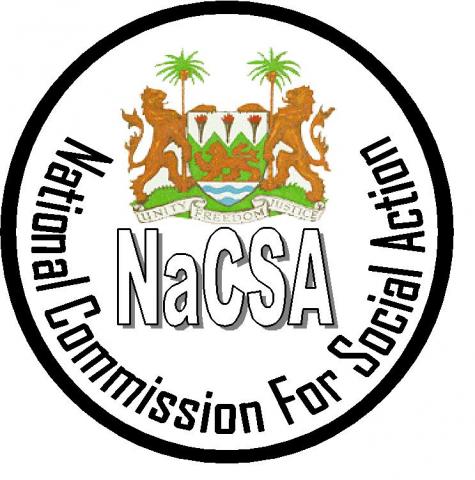By Kemo Cham
The National Commission for Social Action (NaCSA), created to help rehabilitate, reintegrate and resettle fighters and refugees in the war in Sierra Leone in the 90s, has been transformed into a permanent public institution.
NaCSA’s permanent status was sealed by parliament on Thursday 7th November when it passed into law a Bill entitled: “The National Commission for Social Action Act 2019”.
The bill was first presented to Parliament on Tuesday October 29.
NaCSA, a post-war recovery agency was first established in 1996 as the National Commission for Reconstruction, Resettlement and Rehabilitation. It assumed its current nomenclature in 2001, through an Act of Parliament, which was amended in 2008 and in 2015.
Its foundation Act demanded that NaCSA renew its mandate after every 10 years, the last of which expired in 2018.
Throughout this period, NaCSA operated as a semiautonomous government agency that helped in implementing the development work of Ministries, Departments and Agencies (MDAs). Among its many functions include embarking on social safety programs and other projects geared towards improving the lives of the urban and rural poor in the country. It played a vital role in rebuilding the country following the end of the 1991-2002 civil war.
Henceforth NaCSA will be responsible for the promotion and implementation of community-based, sustainable social protection and development programmes, among other related matters.
Minister of Planning and Economic Development, Dr Francis Kaikai, under whose ministry NaCSA operates, said the need to establish NaCSA as a permanent body was important to instill confidence in the institution.
“This is very significant, as everyone said, NaCSA cannot continue to operate as a temporary institution,” he said while presenting the bill to the House.
Dr Kaikai, who was head of the National Commission for Disarmament, Demobilisation and Reintegration (NCDDR) just after the war, added that turning the Commission into a permanent agency would give comfort to the staff and assure more predictability for the institution.
“They [institution] will be able to raise funds and donors are able to see them as a permanent fixture in the development landscape of Sierra Leone,” Kaikai told Politico in an interview.
The passing of the new Act last week was briefly delayed due to concerns raised by some MPs over issues like the composition of the Board and the placement of NACSA under the direct supervision of the Vice-President, instead of the President.
There were also concerns among some MPs on the oversight role shared between the Special Committee for NaCSA in Parliament and the presidency.
Others wanted the President to be in charge of the Commission, instead of the Vice President who they say has the lone function of representing the president in his absence.
NGC parliamentary leader, Dr. Kandeh Yumkella, was notably opposed to the placement of the agency under the supervision of the VP.
“NASCA should be placed under the direct supervision of the President, who in turn should delegate the Vice-President,” he was quoted in a news release from the Communications Unit of the House. Yumkella is also said to have pushed for the NaCSA Board to be composed of experts in development.
The Leader of Government Business, Sidie M. Tunis, allayed the fears of Dr. Yumkella and other skeptics, saying that due to the “exemplary performance” of the Vice-President and in light of the “New Direction” to make the Office of the Vice-President more functional, President Bio in a Cabinet conclusion decided to place NACSA under the direct supervision of the Vice-President.
Another major concern among MPs was a provision in the bill that gives board members of the agency immunity for their actions if they act in “good faith”.
According to the Parliamentary communication unit, the Acting Leader of the Opposition in the house, Ibrahim Ben Kargbo, supported the position of Government to make NACSA a permanent agency of Government.
© 2019 Politico Online









